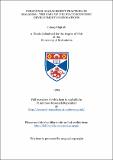Personnel management practices in Malaysia - the case of the State Economic Development Corporations
Abstract
This thesis examines personnel management policies and practices within the State Economic Development Corporations (SEDCs) of the Malaysian economy. It is concerned to explore and access the contemporary influence and significance of personnel managers and their policies on routine SEDC practices. Under the Malaysian government's New Economic Policy (NEP) of 1970, SEDCs are expected to provide employment, training and development of Bumiputra employees (i.e. Malay and other indigenous groups), to produce Bumiputra entrepreneurs and to increase their participation and ownership in the Malaysian commercial and industrial sectors. The empirical research which informs this thesis was designed to examine, first, whether these political, social and economic commitments have and do facilitate the development and emergence of personnel management in the SEDCs. Second, whether personnel managers currently play a significant role in ensuring that these objectives are met, and third whether there is a more significant contribution that personnel managers and policies could potentially make to the employment practices of SEDCs. An overall finding of the empirical research is that there are significant barriers restricting the presence and influence of professional personnel managers in SEDCs. In 8 out of 11 SEDCs there was no separate personnel function or specialised, trained personnel manager. These primary research findings both reflect and reinforce a theme that can be found in some of the more critical personnel management literature which highlights the potential difficulties faced by some personnel managers and the negative consequences of the absence of personnel department in a great variety of organisations, industries and countries. Studies of personnel management suggest that barriers to effective personnel management practices include: the low status of personnel managers, their subordinate relationship to line managers and the prevailing definition of organisational effectiveness that concentrates exclusively upon financial results. Many of the negative consequences of the absence of personnel management such as informalisation, inconsistency, inefficiency of personnel practices have been pointed out. In this research, various cultural, political, legal and structural factors that constitute barriers to personnel management were found. In most SEDCs, the economic and social contributions of the personnel management and the significant role of personnel managers were de-emphasized and neglected. The absence of formalised, decentralised and standardized personnel management causes ad hoc and unsystematic manpower planning and training, discrimination in selection and promotion and a lack of motivational practices. In addition to examining these barriers, the thesis also seeks to highlight where appropriate facilitators to the development of personnel management as well as the potential impact on SEDCs employment practices of personnel management practices and initiatives.
Type
Thesis, PhD Doctor of Philosophy
Collections
Items in the St Andrews Research Repository are protected by copyright, with all rights reserved, unless otherwise indicated.

